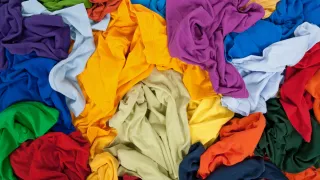GRETE, the Green chemicals and technologies for the wood-to-textile value chain project, has been granted EUR 2.6 million by the Bio-based Industries Joint Undertaking (BBI JU), which is partnership between the EU and the Bio-based Industries Consortium. The project will improve the existing wood-to-textile value chains by developing breakthrough technologies that can open up the identified bottlenecks and enable increased production of man-made cellulose fibres in Europe.
The GRETE project will tackle the bottlenecks of creating wood-to-textile value chains by developing innovative technologies for wood pulp modification, cellulose dissolution and fibre quality generation. Currently, the raw material base for the production of man-made cellulose fibres is limited as only dissolving grade wood pulps are used commonly. The project will tackle this by widening the sustainable raw material basis for man-made cellulose fibres.
"More sustainable textile fibres are in high demand. A route of great potential, in this respect, is wood-based textile fibres. With the GRETE project we aim to find improved technologies for the wood-to-textile fibre value chain", explains CEO Niklas von Weymarn, Metsä Spring.
The solvent systems used for the production of commercial man-made cellulose viscose and lyocell fibres are based on toxic and explosive chemicals, but the GRETE technologies will increase safety, sustainability and feasibility of man-made cellulose fibre manufacturing. Currently, there are several steps in the textile production value chain, e.g. finishing treatments and dyeing of textiles, which cause extensive freshwater pollution. Fibres with novel functional properties open up the possibility for targeted and water-scarce finishing treatments.
The Executive Director for Innovation and Technological Development at Altri SA, Gabriel Sousa, describes their motivation for taking part in the project: "By participating in the GRETE project, Celbi SA - a subsidiary of Altri SA - will gain understanding on the pulp-regenerated cellulose-textile value chain and technologies and also understand the key requirements and specs for pulp on future markets. Celbi also aims to gain a clear view on the viability of ionic liquids use for cellulosic textile fibres."
The issues to be solved in the project play a significant role in developing sustainable and green technologies for the European industry. The industrial partners of the project are strongly committed to the project and a separate stakeholder group will provide assistance to strategic decision-making. The consortium is led by VTT, and is built around many of the most distinguished research centres and universities acting in this field.
The project is coordinated by VTT. Partners: University of Helsinki, Universität für Bodenkultur Wien, Universidade de Aveiro, Metsä Spring Oyj, Celbi SA, Material Connexion Italia SRL and Vertech Group.




